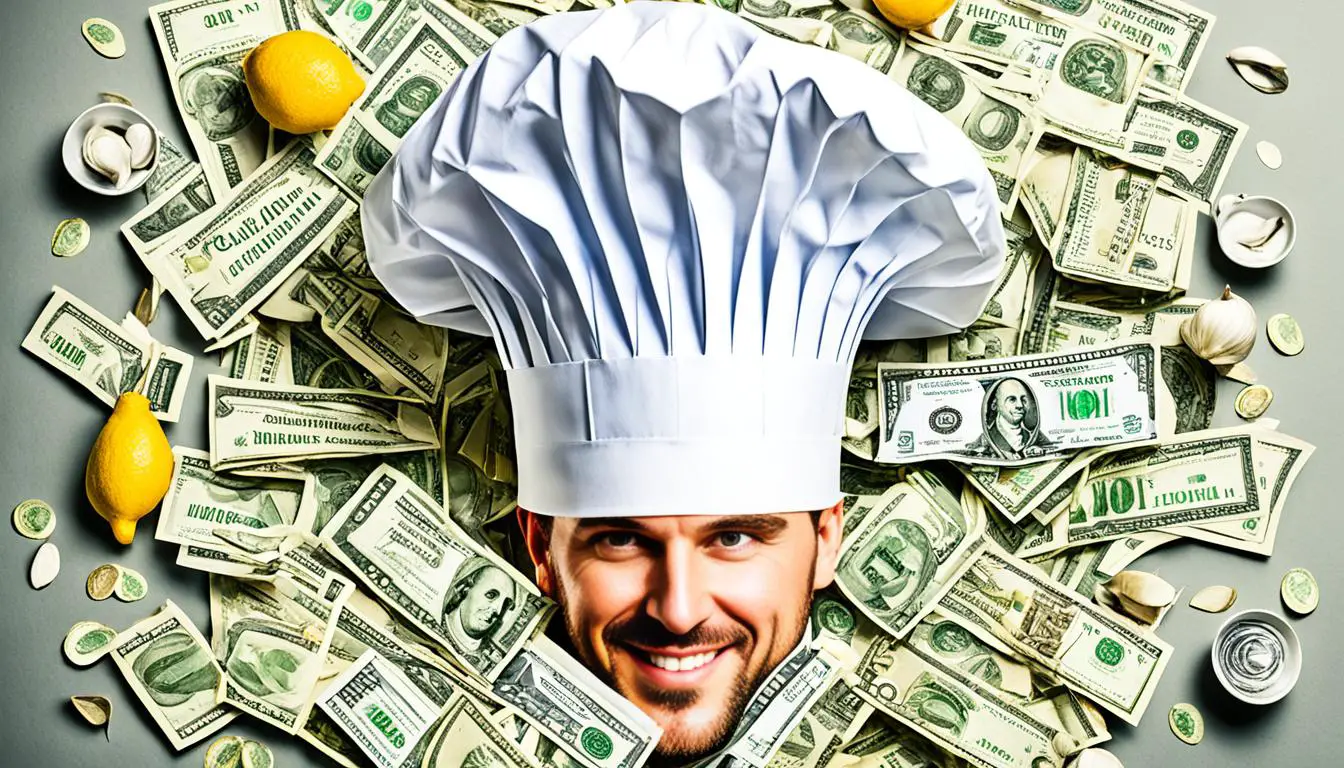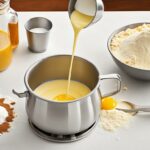Originally posted on February 10, 2024 @ 8:17 am
Are you considering a career as a recipe developer? Wondering about the salary potential for this creative and culinary profession? Look no further! In this article, we will provide you with the essential information you need to understand the recipe developer salary landscape and the factors that can affect your earning potential.
Working as a recipe developer can be both rewarding and financially fulfilling. However, it’s important to note that the salary range for recipe developers can vary significantly based on various factors. Factors such as your experience level, location, and the type of projects you work on can all play a role in determining your compensation.
Contents
- 1 Factors Affecting Recipe Developer Salaries
- 2 Typical Rates for Recipe Development
- 3 Rates for Recipe Testing
- 4 Factors Considered when Accepting Lower Rates
- 5 Other Considerations for Recipe Developers
- 6 Insights from Recipe Developers
- 7 Testimonials from Recipe Developers
- 8 Conclusion
- 9 Resources for Recipe Developers
- 10 Frequently Asked Questions (FAQ)
- 11 FAQ
- 11.1 How much does a recipe developer make?
- 11.2 What factors affect recipe developer salaries?
- 11.3 What are the typical rates for recipe development?
- 11.4 How much do recipe testers charge?
- 11.5 What factors are considered when accepting lower rates as a recipe developer?
- 11.6 What other considerations should recipe developers keep in mind?
- 11.7 What insights do experienced recipe developers offer?
- 11.8 Are there any testimonials from recipe developers?
- 11.9 What are some resources for recipe developers?
- 11.10 Do you have any more information on recipe developer salaries?
- 12 Source Links
Key Takeaways:
- Recipe developer salaries can vary widely based on factors such as experience, location, and project type.
- The average rate for recipe development without a photo is around $200 to $400 per recipe, with some developers earning over $700 per recipe.
- Adding a photo to the recipe can increase the rate by at least $100, while offering video services can command an additional $200 to $500.
- Recipe testers generally charge between $100 and $150 per test.
- Factors such as long-term contracts, exposure opportunities, and working with prestigious clients may influence the decision to accept lower rates.
Factors Affecting Recipe Developer Salaries
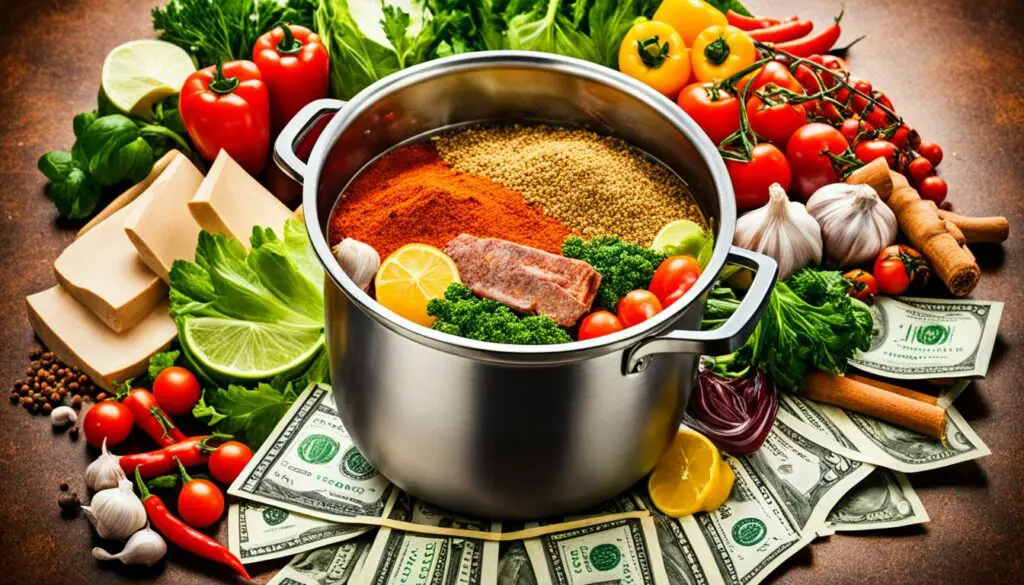
Several factors can influence the salary of a recipe developer. While experience is often considered a key factor, a survey conducted by Alicia Kennedy found that years of experience do not necessarily correlate with higher rates. However, there are other significant factors that contribute to the determination of recipe developer salaries:
Type of Client or Publication
The type of client or publication that a recipe developer works with can have a significant impact on their salary. Developers who work with high-profile clients or prestigious publications may command higher rates due to the reputation and exposure they gain.
Complexity of the Recipe
The complexity of the recipe can also affect the salary of a recipe developer. More intricate recipes that require extensive research and testing may warrant higher compensation compared to simpler recipes.
Inclusion of a Photo or Video
Recipe developers who provide additional services, such as including a photo or video along with the recipe, may have the opportunity to earn higher rates. Visual elements enhance the appeal and quality of the recipe, making it more valuable to clients.
Expense Reimbursement
Recipe developers should also consider whether expenses, such as ingredient costs, are reimbursed. Reimbursement for expenses can significantly affect the overall compensation for recipe development work.
“The type of client or publication, the complexity of the recipe, the inclusion of a photo or video, and whether expenses such as ingredients are reimbursed are all important factors that determine the salary of a recipe developer.” – Alicia Kennedy
It’s important to note that recipe developers may consider accepting lower rates for certain situations. Long-term contracts, exposure opportunities, and the chance to work with prestigious clients can provide valuable career advantages that may outweigh the lower pay in the short term. It’s essential for recipe developers to assess the overall value of a project before finalizing compensation agreements.
Average Salary Range for Recipe Developers
| Factors | Average Salary Range |
|---|---|
| Experience | No direct correlation to higher rates |
| Type of client or publication | Varies based on reputation and exposure |
| Complexity of the recipe | Higher rates for more intricate recipes |
| Inclusion of a photo or video | Higher rates for additional visual elements |
| Expense reimbursement | Affects overall compensation |
Considering these factors can help recipe developers negotiate fair compensation based on the specific requirements of each project.
Typical Rates for Recipe Development
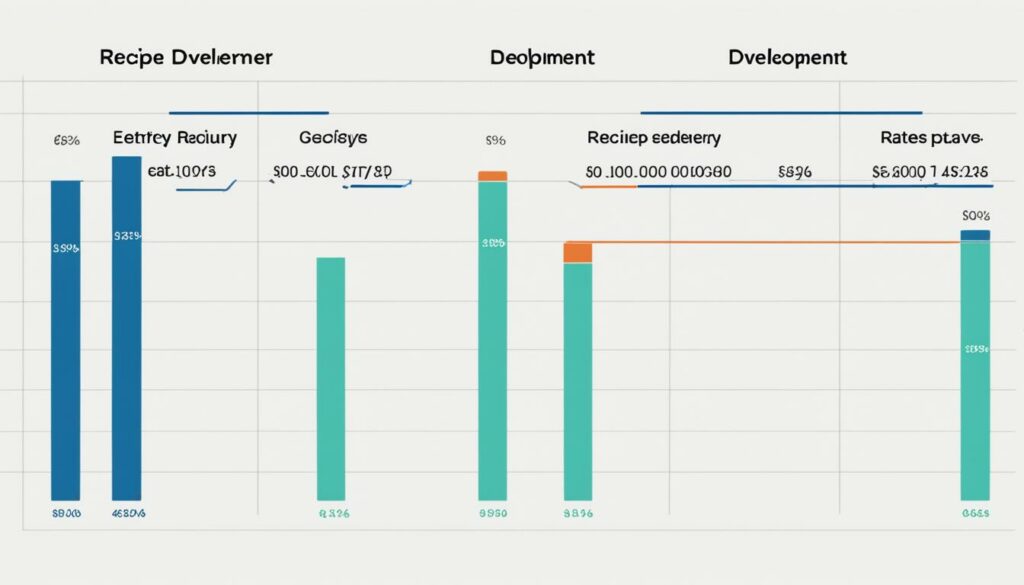
When it comes to recipe development rates, there is no one-size-fits-all answer. However, based on a survey conducted by Alicia Kennedy, we can provide some insights into the typical rates in the industry.
The survey revealed that the average rate for recipe development without a photo is around $250 per recipe, although some recipe developers charge more. It’s important to note that rates can vary widely, with some experienced developers earning over $700 per recipe.
Adding a photo to the recipe can increase the rate by at least $100, as visual content is highly sought after by clients and publications. Additionally, if you offer video services alongside recipe development, you can command even higher fees, ranging from $200 to $500.
When determining rates for recipe development projects, it’s crucial to consider the value you bring to the table. Your expertise, creativity, and ability to develop enticing recipes that resonate with readers can have a significant impact on the compensation you deserve.
In order to negotiate fair rates, it’s essential to communicate your worth to clients or employers. Highlight your unique skills, experience, and the value you bring to their project. This can help you secure the compensation you deserve as a recipe developer.
Rates for Recipe Testing
When it comes to recipe testing, the rates charged by recipe testers can vary depending on several factors. On average, recipe testers typically charge between $100 and $150 per test. However, it’s important to note that rates can differ based on various considerations.
Some recipe testers may be willing to accept lower rates for projects that have specific circumstances or requirements. These could include factors such as working with new clients, testing simpler recipes, or projects that offer exposure opportunities. In some cases, recipe testers may also negotiate their rates based on the complexity of the recipe or the level of detailed feedback they provide.
It’s crucial for recipe testers to consider their expertise and the amount of time and effort required for each test when determining their rates. Experienced testers who provide comprehensive reports and valuable insights may charge higher fees compared to those who offer basic testing services. Additionally, recipe testers need to factor in the cost of ingredients and any additional expenses they might incur during the testing process when determining their fees.
Factors Influencing Recipe Testing Rates:
- Complexity of the recipe
- Level of detailed feedback required
- Expertise and experience of the recipe tester
- Reimbursement for ingredient costs
- Additional expenses associated with testing
By considering these factors and negotiating rates accordingly, recipe testers can ensure they are compensated fairly for their valuable contribution to the recipe development process.
Customer Testimonial:
“As a recipe tester, I’ve found that my rates vary depending on the specific project. For straightforward recipes that require minimal feedback, I charge around $100 per test. However, for complex recipes that demand detailed analysis and adjustments, my rates can go up to $150. It’s important to assess the time and effort required for each test to determine fair compensation. Remember to consider your expertise and the value you bring to the testing process.” – Emily Thompson, Recipe Tester
| Factors | Average Rate |
|---|---|
| Simple recipes with minimal feedback | $100 per test |
| Complex recipes with detailed analysis | $150 per test |
Factors Considered when Accepting Lower Rates
As a recipe developer, there may be instances where you consider accepting lower rates for your services. While it’s important to value your expertise and time, there are several factors that can influence the decision to accept lower rates:
- Long-term contracts: Accepting a lower rate for a long-term contract can provide a stable income stream and potential for future growth.
- Prestigious publications or brands: Working with high-profile publications or renowned brands can offer exposure and reputation-building opportunities that make accepting lower rates worthwhile.
- Exposure opportunities: If a project offers significant exposure to a wide audience, it may be worth considering a lower rate to enhance your visibility and attract potential clients.
- Ease of preparation and ingredient acquisition: Some recipes may require less complexity or use readily available ingredients, which can make accepting lower rates more feasible.
- Breaking into new areas or working with friends: Accepting lower rates when entering a new market or collaborating with friends can help establish valuable connections and pave the way for future opportunities.
It’s important to carefully assess each situation and weigh the potential benefits against the lower compensation. Consider the value of the project, the potential for future work, and any non-monetary advantages before accepting lower rates as a recipe developer.
Other Considerations for Recipe Developers
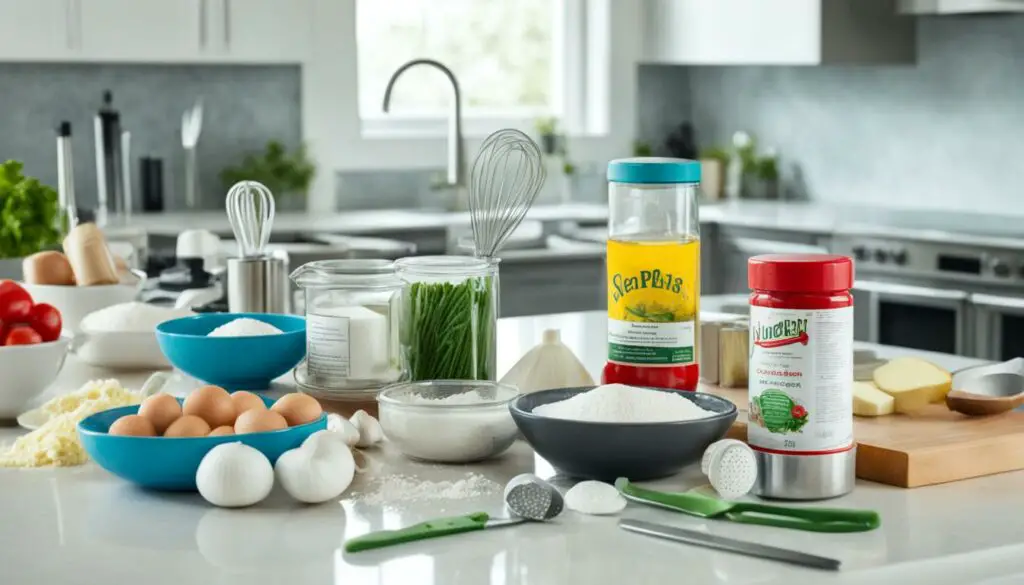
In addition to rates, there are several other important factors that recipe developers should consider when it comes to their compensation. These considerations can have a significant impact on their overall earnings and career growth. Here are some key tips and factors to keep in mind:
1. Reimbursement for Ingredients
One important factor for recipe developers to consider is whether they will be reimbursed for the cost of ingredients. This can vary depending on the client or publication, and it’s crucial to factor in these expenses when negotiating rates. Taking into account ingredient costs ensures that you are being fairly compensated for your work.
2. Difficulty of the Project or Recipe
The complexity of a project or recipe can also affect the efforts and time required for recipe development. More complex recipes may involve extensive testing, research, or experimentation, which can impact the overall compensation. It’s important to consider the level of difficulty when determining rates and to adjust accordingly.
3. Time Required to Complete the Assignment
Another essential consideration is the time commitment required to complete a recipe development assignment. Some recipes may require more time for testing, revisions, or additional consultations with clients. Taking into account the amount of time and effort you invest in a project helps ensure you are adequately compensated for your expertise and dedication.
4. Potential for Ongoing Work or Career Advancement
Recipe developers should also consider the potential for ongoing work or career advancement when determining their compensation. Building relationships with clients who offer future projects or opportunities for growth can be valuable in the long term. While it’s important to negotiate fair rates, it’s also essential to consider the bigger picture and the potential for career advancement in the industry.
By taking these factors into consideration, recipe developers can make informed decisions when it comes to their compensation and ensure that they are being fairly rewarded for their skills, expertise, and dedication.
| Consideration | Description |
|---|---|
| Reimbursement for Ingredients | Recipe developers should factor in the cost of ingredients and negotiate fair compensation that includes reimbursement for these expenses. |
| Difficulty of the Project or Recipe | The complexity of a recipe or project should be considered when setting rates, as more challenging assignments may require additional time and expertise. |
| Time Required to Complete the Assignment | The amount of time and effort required to complete a recipe development assignment should be taken into account when determining fair compensation. |
| Potential for Ongoing Work or Career Advancement | Considering the potential for future work and career growth can help recipe developers negotiate rates that align with their long-term goals. |
Insights from Recipe Developers

Experienced recipe developers have shared valuable insights and advice based on their own experiences. Their expertise offers valuable guidance to aspiring recipe developers. Let’s take a look at some of their tips and recommendations:
1. Distinguishing Rates with and without Reimbursement for Groceries
Recipe developers emphasize the importance of defining rates considering whether grocery expenses are reimbursed or not. Negotiating fair compensation is crucial to ensure that the effort and investment required to source ingredients are appropriately accounted for.
2. Variation in Pay Rates across Different Types of Clients
It is important to consider that pay rates can vary significantly depending on the type of client or publication you work with. Branded work often offers higher compensation compared to media outlets, as it typically involves collaborations and partnerships that carry more weight in terms of exposure and potential future work opportunities.
“I find that working with established brands not only pays well but also exposes my recipes to a larger audience. It’s a win-win situation where I get compensated fairly and gain recognition for my work.” – Jane Anderson, Professional Recipe Developer
3. Culinary Knowledge vs. Social Media Followers
Some recipe developers express frustration about the increasing emphasis on social media followers rather than culinary knowledge. They suggest that this cultural shift can sometimes compromise the quality and authenticity of recipes. Aspiring developers are encouraged to highlight their expertise and focus on delivering high-quality recipes based on culinary knowledge and experience.
4. Consideration of Project Difficulty and Sourcing Information
When determining rates, it is essential to consider the difficulty of the project or recipe you are working on and the ease of sourcing information. More complex recipes or projects that require extensive research and development should be appropriately compensated to reflect the additional time and effort invested.
Table: Common Factors Considered by Recipe Developers
| Factors Considered | Importance |
|---|---|
| Type of Client or Publication | High |
| Reimbursement for Groceries | High |
| Project or Recipe Complexity | Medium |
| Difficulty in Sourcing Information | Low |
By taking these insights into consideration, recipe developers can navigate the industry with confidence and negotiate rates that reflect their skills and expertise.
Testimonials from Recipe Developers
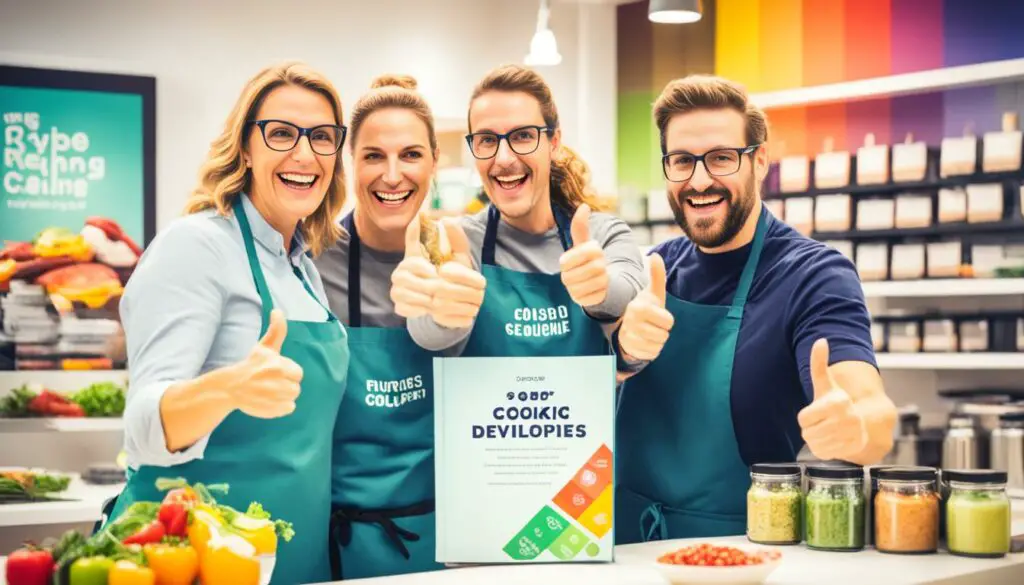
Let’s hear from recipe developers themselves about their experiences and the rates they charge for various projects. These testimonials provide valuable insights into the compensation landscape in the recipe development field and highlight the diversity in rates.
“As a recipe developer, I’ve had the opportunity to work on a wide range of projects. For recipe testing, I typically charge around $75 per test. However, for recipe development with a styled photo, my rates start at $400 and can go higher depending on the complexity of the recipe and the client’s requirements. Negotiating fair compensation is crucial in this industry.”
– Sarah Thompson, Recipe Developer
“I’ve been an established recipe developer for several years now. Feedback from recipe developers like me is vital in assessing how rates have evolved over time. I charge around $100 for recipe testing and between $200 to $300 for recipe development without a photo. These rates are based on my experience and the value I bring to each project.”
– Michael Ramirez, Recipe Developer
These testimonials demonstrate the importance of negotiating fair compensation based on the specific project requirements. Rates can vary significantly depending on factors such as experience, recipe complexity, and the inclusion of styled photos or videos. Recipe developers should carefully consider these factors and their own value proposition to ensure they receive appropriate compensation for their work.
Real-World Examples of Compensation Rates
| Project Type | Rate Range |
|---|---|
| Recipe Testing | $75+ |
| Recipe Development without Photo | $200-$300+ |
| Recipe Development with Styled Photo | $400+ |
These are just a few examples of the rates recipe developers charge. It’s important to note that rates may vary based on factors such as the developer’s expertise, the client’s budget, and the overall scope of the project. Recipe developers should always assess the value they bring and negotiate fair compensation that aligns with their skills and experience.
Conclusion
After examining the factors that influence recipe developer salaries and typical rates in the industry, it is evident that there is a wide range of earning potential. The salary of a recipe developer is highly dependent on variables such as experience, project complexity, and reimbursement for expenses.
While a definitive average salary for recipe developers may not exist, insights from a survey of industry professionals provide valuable information. Rates for recipe development without a photo typically range from $200 to $400 per recipe, with some developers earning over $700 per recipe. Adding a photo can increase the rate by at least $100, and offering video services can command an additional $200 to $500. Recipe testers generally charge between $100 and $150 per test.
It is crucial for recipe developers to assess the value they bring to each project and negotiate fair compensation accordingly. Considering factors such as long-term contracts, exposure opportunities, and future work potential can also guide decisions when accepting lower rates. By evaluating these factors and advocating for their worth, recipe developers can aim to establish a sustainable and rewarding career in the industry.
As a recipe developer, it is important to stay informed about industry standards and continuously refine skills. Joining professional associations and networks can provide access to valuable resources and insights. Engaging in ongoing learning and staying connected to the recipe development community can contribute to long-term success in the field.
| Factors | Impact on Salary |
|---|---|
| Experience | Varies, not necessarily correlated with higher rates |
| Type of project/client | Can influence rates and opportunities for higher compensation |
| Complexity of recipe | May command higher rates for intricate or unique recipes |
| Reimbursement for expenses | Can significantly impact overall compensation |
| Additional services (e.g., photos, videos) | Can escalate rates, increasing earning potential |
| Acceptance of lower rates | Consideration of factors such as long-term contracts, exposure, or breaking into new areas |
Resources for Recipe Developers
As a recipe developer, it’s important to have access to valuable resources and tools that can help you navigate the world of compensation. Here are some recommended resources to support your career:
Industry Websites and Forums
Stay updated on current trends, share insights, and connect with other recipe developers through industry websites and forums. Some popular options include:
- Food52 Community Forum
- Devour Blog by QuickBooks
- Reddit /r/RecipeDevelopment
Professional Networks
Join professional networks to expand your connections and gain access to resources and support from fellow recipe developers. Consider joining the following networks:
- International Association of Culinary Professionals (IACP)
- Food Bloggers of Canada
- Association of Food Journalists (AFJ)
Workshops and Conferences
Attending workshops and conferences related to food and recipe development can provide valuable insights, learning opportunities, and networking possibilities. Look for events such as:
- Recipe Developer Bootcamp
- Food Media Forum
- Tastemaker Conference
Online Courses and Webinars
Enhance your skills and knowledge with online courses and webinars specifically designed for recipe developers. Some reputable platforms offering such courses include:
- Udemy
- LinkedIn Learning
- Culinary Institute of America (CIA)
Books and Publications
Expand your culinary library with books and publications that cover recipe development, food styling, and other related topics. Some recommended reads include:
- “The Recipe Developer’s Handbook” by Jacqueline Bellefontaine
- “The Food Stylist’s Handbook” by Denise Vivaldo
- “Will Write for Food” by Dianne Jacob
Professional Associations
Consider joining professional associations or organizations that focus on food and recipe development. These associations can provide access to valuable resources, job boards, and networking opportunities. Some notable associations include:
- The American Association of Food Professionals (AAFP)
- The Culinary Trust
- The International Food Blogger Conference (IFBC)
By utilizing these resources, you can enhance your knowledge, expand your network, and stay current in the ever-evolving field of recipe development.
| Resource | Description |
|---|---|
| Food52 Community Forum | An online community where recipe developers can connect, share insights, and seek advice from fellow professionals. |
| Devour Blog by QuickBooks | A blog that provides helpful articles and resources specifically tailored to recipe developers and food bloggers. |
| Reddit /r/RecipeDevelopment | A subreddit dedicated to recipe development, where professionals can discuss industry trends, ask questions, and share their expertise. |
| International Association of Culinary Professionals (IACP) | An organization that brings together culinary professionals, offering networking opportunities, educational events, and industry recognition. |
| Food Bloggers of Canada | A community that supports and connects Canadian food bloggers, providing resources, workshops, and events. |
| Association of Food Journalists (AFJ) | A professional organization for food journalists and recipe developers, offering resources, workshops, and awards. |
Frequently Asked Questions (FAQ)
Are recipe developers paid a fixed salary or on a per-project basis?
Recipe developers are usually paid on a per-project basis. The amount they earn can vary based on factors such as the complexity of the project, inclusion of photos or videos, and reimbursement for ingredients.
What is the average salary range for recipe developers?
There isn’t an exact average salary for recipe developers as it can vary widely. However, according to a survey, typical rates for recipe development without a photo range from $200 to $400 per recipe. Adding a photo can increase the rate by at least $100, and offering video services can command an additional $200 to $500. Recipe testers generally charge between $100 and $150 per test.
What are the factors that can influence recipe developer salaries?
Several factors can affect recipe developer salaries, including experience, type of client or publication, complexity of the recipe, and reimbursement for expenses. Additionally, recipe developers may consider accepting lower rates for certain situations, such as long-term contracts, exposure opportunities, or working with prestigious clients.
FAQ
How much does a recipe developer make?
The salary of a recipe developer can vary widely depending on factors such as experience, location, and the type of projects they work on. While there isn’t an exact average salary for recipe developers, rates for recipe development without a photo typically range from $200 to $400 per recipe, with some developers earning over $700 per recipe.
What factors affect recipe developer salaries?
Several factors can influence the salary of a recipe developer, including experience, type of client or publication, complexity of the recipe, inclusion of a photo or video, and reimbursement for expenses such as ingredients.
What are the typical rates for recipe development?
The typical rate for recipe development without a photo is around $250 per recipe, with some developers charging more. Rates can vary widely, with some developers earning over $700 per recipe. Adding a photo to the recipe can increase the rate by at least $100, and offering video services can command even higher fees.
How much do recipe testers charge?
Recipe testers typically charge between $100 and $150 per test, although rates can vary. Some testers may accept lower rates based on factors such as the complexity of the recipe or the inclusion of detailed feedback.
What factors are considered when accepting lower rates as a recipe developer?
Recipe developers may consider accepting lower rates for long-term contracts, exposure opportunities, working with prestigious clients, ease of preparation and ingredient acquisition, or breaking into new areas.
What other considerations should recipe developers keep in mind?
In addition to rates, recipe developers should also consider factors such as reimbursement for ingredients, project or recipe difficulty, time required, and potential for ongoing work or career advancement.
What insights do experienced recipe developers offer?
Experienced recipe developers recommend distinguishing rates with and without reimbursement for groceries, assessing the value of the project, and considering the difficulty of the project or recipe when determining rates.
Are there any testimonials from recipe developers?
Yes, there are testimonials from recipe developers that provide real-world examples of compensation in the field, with rates ranging from $75 for recipe testing to $400 or more for recipe development with a styled photo.
What are some resources for recipe developers?
Recipe developers can find valuable resources and tools through industry websites, forums, professional networks, and joining food and recipe development associations or organizations.
Do you have any more information on recipe developer salaries?
For more information on recipe developer salaries, please refer to the other sections in this guide.

